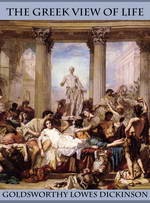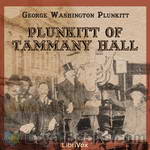|
Books Should Be Free Loyal Books Free Public Domain Audiobooks & eBook Downloads |
|
|
Books Should Be Free Loyal Books Free Public Domain Audiobooks & eBook Downloads |
|
Books on Politics |
|---|
|
Book type:
Sort by:
View by:
|
By: Goldsworthy Lowes Dickinson (1862-1932) | |
|---|---|
 The Greek View of Life
The Greek View of Life
“With the Greek civilisation beauty perished from the world. Never again has it been possible for man to believe that harmony is in fact the truth of all existence.”This elegantly-written work provides a splendid introduction to the Greeks of the classic period: how they thought, wrote, and organised their lives and loves. Although it dates from the 1890s, there is very little about it that has dated. To its author’s credit, the subject of “Greek love” is dealt with in a sane and factual context - despite the judicial assassination of Oscar Wilde going on in the background... | |
By: Thorstein Veblen (1857-1929) | |
|---|---|
 An Inquiry Into The Nature Of Peace And The Terms Of Its Perpetuation
An Inquiry Into The Nature Of Peace And The Terms Of Its Perpetuation
| |
By: Mohandas Karamchand Gandhi | |
|---|---|
 Third Class in Indian Railways
Third Class in Indian Railways
Mohandas Karamchand Gandhi (1869 – 1948) was the pre-eminent political and spiritual leader of India during the Indian independence movement. He was the pioneer of satyagraha — resistance to tyranny through mass civil disobedience. This philosophy was firmly founded upon ahimsa, or total nonviolence, and led India to independence and inspired movements for civil rights and freedom across the world. Gandhi is commonly known around the world as Mahatma Gandhi and in India also as Bapu. He is officially honoured in India as the Father of the Nation; his birthday, 2 October, is commemorated there as Gandhi Jayanti, a national holiday. | |
By: United States | |
|---|---|
 United States Declaration of Independence (HTML)
United States Declaration of Independence (HTML)
| |
By: Mrs. Eugenia Dunlap Potts (1840-1912) | |
|---|---|
 Historic Papers on the Causes of the Civil War
Historic Papers on the Causes of the Civil War
While claiming to be historical papers on the causes of the United States Civil War, the author indulges in some Slavery Apologetics. An interesting view from a southern lady on what caused the war and why the south was the underdog. | |
By: Frank Norris (1870-1902) | |
|---|---|
 The Octopus
The Octopus
Frank Norris based his 1901 novel The Octopus (A Story of California) on the Mussel Slough Tragedy of 1880, a bloody conflict between ranchers and agents of the Southern Pacific Railroad. The central issue was over the ownership of the ranches, which the farmers had leased from the railroad nearly ten years earlier with intentions of eventually purchasing the land. Although originally priced at $2.50 to $5 per acre, the railroad eventually opened the land for sale at prices adjusted for land improvements; the railroad’s attempts to take possession of the land led the ranchers to defend themselves as depicted in the book. | |
By: George Washington Plunkitt (1842-1924) | |
|---|---|
 Plunkitt of Tammany Hall
Plunkitt of Tammany Hall
“I seen my opportunities and I took ‘em.”, George Washington Plunkitt of Tamminy Hall. There’s honest graft and dishonest graft according to Plunkitt. Listen to this candid discourse from a 19th century politician, and decide for yourself if things have changed. | |
By: Doris Stevens (1892-1963) | |
|---|---|
 Jailed for Freedom
Jailed for Freedom
A first-hand account of the 1913-1919 campaign of American suffragists, detailing their treatment at the hands of the courts, and the true conditions of their incarceration. | |
By: Andrew Jackson (1767-1845) | |
|---|---|
 State of the Union Address
State of the Union Address
| |
By: Susan Glaspell (1876-1948) | |
|---|---|
 Trifles
Trifles
On the surface, this short play is a slice-of-life story about a murder investigation in the rural United States. However, it is also a story about the relationships between men and women, husbands and wives, and the often-overlooked "trifles" which can say so much about a person's life. | |
By: Jane Addams (1860-1935) | |
|---|---|
 Twenty Years at Hull-House
Twenty Years at Hull-House
Jane Addams was the first American woman to be awarded the Nobel Peace Prize. In a long, complex career, she was a pioneer settlement worker and founder of Hull-House in Chicago, public philosopher (the first American woman in that role), author, and leader in woman suffrage and world peace. She was the most prominent woman of the Progressive Era and helped turn the nation to issues of concern to mothers, such as the needs of children, public health and world peace. She emphasized that women have a special responsibility to clean up their communities and make them better places to live, arguing they needed the vote to be effective... | |
 The Spirit of Youth and the City Streets
The Spirit of Youth and the City Streets
Much of the material in the following pages has appeared in current publications. It is here presented in book form in the hope that it may prove of value to those groups of people who in many cities are making a gallant effort to minimize the dangers which surround young people and to provide them with opportunities for recreation. (Introduction by Jane Addams) Jane Addams (1860 – 1935) was the first American woman to be awarded the Nobel Peace Prize. In a long, complex career, she was a pioneer settlement worker and founder of Hull House in Chicago, a public philosopher, a sociologist, an author and a spokesperson for women's suffrage and world peace. | |
By: Henry Adams (1838-1918) | |
|---|---|
 Democracy - An American Novel
Democracy - An American Novel
Not until after his death in 1918 was it revealed that Henry Adams was the anonymous author of Democracy, which had been published to great acclaim in 1880. Though the book avoids dates and the characters are fictitious, the setting is no doubt that of Washington in the 1870s, the age of Presidents Grant and Hayes. The young widow, Madeleine Lee, wealthy and independent, is the protagonist, who leaves her New York for Washington to turn her intelligence to politics and to see what makes her country tick... | |
By: John Maynard Keynes (1883-1946) | |
|---|---|
 Economic Consequences of the Peace
Economic Consequences of the Peace
The Economic Consequences of the Peace (1919) was a best seller throughout the world, published by John Maynard Keynes. Keynes attended the Versailles Conference as a delegate of the British Treasury and argued for a much more generous peace with Germany. The book was critical in establishing a general worldwide opinion that the Versailles Treaty was a brutal and unfair peace towards Germany. It helped to consolidate American public opinion against the treaty and involvement in the League of Nations... | |
By: Friedrich Engels (1820-1895) | |
|---|---|
 Condition of the Working-Class in England in 1844
Condition of the Working-Class in England in 1844
This is Engels' first book (since considered a classic account of England's working class in the industrial age), which argues that workers paid a heavy price for the industrial revolution that swept the country. Engels wrote the piece while staying in Manchester from 1842 to 1844, based on th bohis observations and several contemporary reports conducted over the period. | |
By: Edmund Burke (1729-1797) | |
|---|---|
 Burke's Speech on Conciliation with America
Burke's Speech on Conciliation with America
| |
 The Works of the Right Honourable Edmund Burke, Vol. 09 (of 12)
The Works of the Right Honourable Edmund Burke, Vol. 09 (of 12)
| |
 Thoughts on the Present Discontents, and Speeches, etc.
Thoughts on the Present Discontents, and Speeches, etc.
| |
By: Ivan S. Turgenev (1818-1883) | |
|---|---|
 Virgin Soil
Virgin Soil
| |
By: Elbert Hubbard | |
|---|---|
 Little Journeys to the Homes of the Great
Little Journeys to the Homes of the Great
LITTLE JOURNEYS TO THE HOMES OF AMERICAN STATESMENBy ELBERT HUBBARDBERT HUBBARD A little more patience, a little more charity for all, a little more devotion, a little more love; with less bowing down to the past, and a silent ignoring of pretended authority; a brave looking forward to the future with more faith in our fellows, and the race will be ripe for a great burst of light and life. --Elbert Hubbard It was not built with the idea of ever becoming a place in history: simply a boys' cabin in the woods... | |
By: Francis Fisher Browne (1843-1913) | |
|---|---|
 Every-day Life of Abraham Lincoln
Every-day Life of Abraham Lincoln
This detailed biography covers the places in Lincoln's life: Indiana, Illinois, Washington. It also traces his various roles as storekeeper, serviceman, state legislator, lawyer, politician, Republican Party leader, and of course President. Along the way we learn about his days of hardship as a beginning lawyer, his love for Anne Rutledge, such myths as "Honest Abe," and his deep concerns over the issue of slavery. The author uses Lincoln's correspondence with others to show his personality traits and opinions about topics of his world. | |
By: Katherine Thurston (1875-1911) | |
|---|---|
 The Masquerader
The Masquerader
The Masquerader is one of two Katherine Cecil Thurston’s books that appeared on the Publisher’s Weekly best-sellers list in 1905. The Masquerader is part mystery, part romance and part political thriller – all tied up in one neat package. Nature has a way of sometimes making two people nearly indistinguishable in appearance. Such is the premise for this book. John Chilcote, a British politician, and John Loder, a man down on his luck meet by accident one night during one of London’s worst fogs... | |
By: Ulysses S. Grant (1822-1885) | |
|---|---|
 State of the Union Address
State of the Union Address
| |
By: M. François Guizot (1787-1874) | |
|---|---|
 Memoirs To Illustrate The History Of My Time Volume 1
Memoirs To Illustrate The History Of My Time Volume 1
| |
By: United States Federal Bureau of Investigation | |
|---|---|
 Unidentified Flying Objects
Unidentified Flying Objects
Through the U.S. Freedom of Information Act (FOIA) this series of communications has been de-classified and made public. Most names have been omitted, however much information of the sightings of UFOs in 1947 can be gleaned from these communications which were primarily between the FBI and other U.S. Government and military organizations. | |
By: Benjamin Disraeli (1804-1881) | |
|---|---|
 Lord George Bentinck A Political Biography
Lord George Bentinck A Political Biography
| |
By: Annie Wood Besant (1847-1933) | |
|---|---|
 The Case for India
The Case for India
| |
By: John Addington Symonds (1840-1893) | |
|---|---|
 A Problem in Modern Ethics
A Problem in Modern Ethics
“Society lies under the spell of ancient terrorism and coagulated errors. Science is either wilfully hypocritical or radically misinformed.” John Addington Symonds struck many an heroic note in this courageous (albeit anonymously circulated) essay. He is a worthy Virgil guiding the reader through the Inferno of suffering which emerging medico-legal definitions of the sexually deviant were prepared to inflict on his century and on the one which followed. Symonds pleads for sane human values in... | |
By: Percy Fitzpatrick (1862-1931) | |
|---|---|
 The Transvaal from Within A Private Record of Public Affairs
The Transvaal from Within A Private Record of Public Affairs
| |